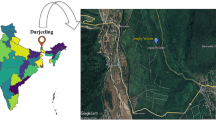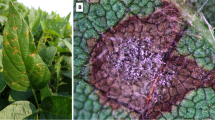Abstract
The biotrophic basidiomycete Phakopsora pachyrhizi is the causal agent of Asian soybean rust (ASR), which has become a serious soybean disease in South America. Control of this disease is mainly based on fungicide applications, with demethylation inhibitors (DMIs), quinone outside inhibitors (QoIs) and succinate dehydrogenase inhibitors (SDHIs) representing a large market. DMIs have been the key component for ASR-control for many years. This ongoing selection pressure has led to an adaptation of P. pachyrhizi resulting in a continuous shift of the population towards reduced sensitivity. The objective of the present study was to characterize the resistance of P. pachyrhizi to DMIs and the underlying mutations in the target gene (CYP51), using single spore isolates for the first time. The fungal populations from which these isolates were obtained, originated from infected soybean leaves from South America. Sequence analyses of the CYP51-gene confirmed three newly identified mutations (V130A, I145V, F154Y), occurring in one allele in combination with previously described mutations. A total of nine mutations were observed in CYP51 of P. pachyrhizi (F120L, V130A, Y131F/H, K142R, I145V/F, F154Y, I475T), present in different combinations. Their locations in the enzyme were shown by CYP51-protein modeling. The newly identified mutation combinations F120L + V130A + Y131F, F120L + Y131H + I145V and F120L + Y131H + F154Y are associated with different sensitivities to DMIs. The sensitivity studies also demonstrated incomplete cross-resistance of P. pachyrhizi to DMIs caused by different mutation combinations. Furthermore, using an isolate mixture (defined population), it could be shown that different DMIs select different mutation combinations. P. pachyrhizi produces dikaryotic uredospores, and moreover, this study confirmed that each spore contains a total of 6 CYP51-copies.



Similar content being viewed by others
Data and material availability
The datasets generated during and/or analysed during the current study are available from the corresponding author on reasonable request.
References
Ahmadian A, Gharizadeh B, Gustafsson AC, Sterky F, Nyrén P, Uhlén M, Lundeberg J (2000) Single-nucleotide polymorphism analysis by pyrosequencing. Anal Biochem 280:103–110. https://doi.org/10.1006/abio.2000.4493
Akamatsu H, Yamanaka N, Yamaoka Y, Soares RM, Morel W, Ivancovich AJG, Bogado AN, Kato M, Yorinori JT, Suenaga K (2013) Pathogenic diversity of soybean rust in Argentina, Brazil, and Paraguay. J Gen Plant Pathol 79:28–40. https://doi.org/10.1007/s10327-012-0421-7
Akinsanmi OA, Ladipo JL, Oyekan PO (2001) First report of soybean rust (Phakopsora pachyrhizi) in Nigeria. Plant Dis 85:97–97. https://doi.org/10.1094/PDIS.2001.85.1.97B
Barrett A (2020) Long-term world soybean outlook. https://ussoy.org/long-term-world-soybean-outlook-2/. Accessed 17 Sept 2022
Becher R, Wirsel SGR (2012) Fungal cytochrome P450 sterol 14α-demethylase (CYP51) and azole resistance in plant and human pathogens. App Microbiol Biotechnol 95:825–840. https://doi.org/10.1007/s00253-012-4195-9
Becher R, Weihmann F, Deising HB, Wirsel SGR (2011) Development of a novel multiplex DNA microarray for Fusarium graminearum and analysis of azole fungicide responses. BMC Genom 12:1–17. https://doi.org/10.1186/1471-2164-12-52
Bonde MR, Nester SE, Austin CN, Stone CL, Frederick RD, Hartman GL, Miles MR (2006) Evaluation of virulence of Phakopsora pachyrhizi and P. meibomiae isolates. Plant Dis 90:708–716. https://doi.org/10.1094/PD-90-0708
Brent KJ, Hollomon DW (2007) Fungicide resistance in crop pathogens: How can it be managed? FRAC Monograph No. 1 (second, revised edition). Fungicide Resistance Action Committee, Global Crop Protection Federation Brussels, Belgium. https://www.frac.info/docs/default-source/publications/monographs/monograph-1.pdf
Bromfield KR (1984) Soybean rust. In: Monograph, American Phytopathological Society. St. Paul, USA, p 65
Childs SP, Buck JW, Li Z (2018) Breeding soybeans with resistance to soybean rust (Phakopsora pachyrhizi). Plant Breed 137:250–261. https://doi.org/10.1111/pbr.12595
Cools HJ, Mullins JGL, Fraaije BA, Parker JE, Kelly DE, Lucas JA, Kelly SL (2011) Impact of recently emerged sterol 14α-Demethylase (CYP51) variants of Mycosphaerella graminicola on azole fungicide sensitivity. Appl Environ Microbiol 77:3830–3837. https://doi.org/10.1128/AEM.00027-11
Corrêa da Silva JV, Juliatti FC, Vaz da Silva JR, Barros FC (2011) Soybean cultivar performance in the presence of soybean Asian rust, in relation to chemical control programs. Eur J Plant Pathol 131:409–418. https://doi.org/10.1007/s10658-011-9818-y
Darben LM, Yokoyama A, Castanho FM, Lopes-Caitar VS, da CruzGallodeCarvalho MC, Godoy CV, deCarvalho S, Gonela A, Marcelino-Guimarães FC (2020) Characterization of genetic diversity and pathogenicity of Phakopsora pachyrhizi mono-uredinial isolates collected in Brazil. Eur J Plant Pathol 156:355–372. https://doi.org/10.1007/s10658-019-01872-2
Fraaije BA, Cools HJ, Kim SH, Motteram J, Clark WS, Lucas JA (2007) A novel substitution I381V in the sterol 14α-demethylase (CYP51) of Mycosphaerella graminicola is differentially selected by azole fungicides. Molecular Plant Pathol 8:245–254. https://doi.org/10.1111/j.1364-3703.2007.00388.x
FRAC (2022) FRAC Code List ©*2022: Fungal control agents sorted by cross-resistance pattern and mode of action. Fungicide Resistance Action Committee (FRAC). https://www.frac.info/docs/default-source/publications/frac-code-list/frac-code-list-2022--final.pdf?sfvrsn=b6024e9a_2. Accessed 28 Sept 2022
García-Rodríguez JC, Vicente-Hernández Z, Grajales-Solís M, Yamanaka N (2021) Virulence diversity of Phakopsora pachyrhizi in Mexico. PhytoFrontiers 2:52–59. https://doi.org/10.1094/PHYTOFR-06-21-0044-R
Godoy CV, Seixas CDS, Soares RM, Marcelino-Guimarães FC, Meyer MC, Costamilan LM (2016) Asian soybean rust in Brazil: past, present, and future. Pesqui Agropecu Bras 51:407–421. https://doi.org/10.1590/S0100-204X2016000500002
Godoy CV (2012) Risk and management of fungicide resistance in the Asian soybean rust fungus Phakopsora pachyrhizi. In: Fungicide resistance in crop protection: risk and management. CABI, Wallingford, England, pp 87–95. https://doi.org/10.1079/9781845939052.0087
Goellner K, Loehrer M, Langenbach C, Conrath U, Koch E, Schaffrath U (2010) Phakopsora pachyrhizi, the causal agent of Asian soybean rust. Mol Plant Pathol 11:169–177. https://doi.org/10.1111/j.1364-3703.2009.00589.x
Hartman GL, Bonde MR, Miles MM, Frederick RD (2004) Variation of Phakopsora pachyrhizi isolates on soybean. In: Proceedings of the VII World Soybean Research Conference, Londrina, Brazil, pp 440–446. http://soydiseases.illinois.edu/publications/Variation_of_Phakopsora_pachyrhizi_isolates_on_soybean.pdf
Hoffmeister M, Zito R, Böhm J, Stammler G (2021) Mutations in Cyp51 of Venturia inaequalis and their effects on DMI sensitivity. J Plant Dis Prot 128:1467–1478. https://doi.org/10.1007/s41348-021-00516-0
Huf A, Rehfus A, Lorenz KH, Bryson R, Voegele RT, Stammler G (2018) Proposal for a new nomenclature for CYP51 haplotypes in Zymoseptoria tritici and analysis of their distribution in Europe. Plant Pathol 67:1706–1712. https://doi.org/10.1111/ppa.12891
Jiang Y, Yin J (2022) Analysis on global registrations, formulas and market situation of prothioconazole products. AgroNews. https://news.agropages.com/News/NewsDetail---41738.htm. Accessed 28 Sept 2022
Jorge VR, Silva MR, Guillin EA, Freire MCM, Schuster I, Almeida AMR, Oliveira LO (2015) The origin and genetic diversity of the causal agent of Asian soybean rust, Phakopsora pachyrhizi, in South America. Plant Pathol 64:729–737. https://doi.org/10.1111/ppa.12300
Jørgensen LN, Matzen N, Hansen JG, Semaskiene R, Korbas M, Danielewicz J, Glazek M, Maumene C et al (2018) Four azoles’ profile in the control of Septoria, yellow rust and brown rust in wheat across Europe. Crop Prot 105:16–27. https://doi.org/10.1016/j.cropro.2017.10.018
Jørgensen LN, Matzen N, Heick TM, Havis N, Holdgate S, Clark B, Blake J, Glazek M et al (2021) Decreasing azole sensitivity of Z. tritici in Europe contributes to reduced and varying field efficacy. J Plant Dis Prot 128:287–301. https://doi.org/10.1007/s41348-020-00372-4
Levy C (2005) Epidemiology and chemical control of soybean rust in Southern Africa. Plant Dis 89:669–674. https://doi.org/10.1094/PD-89-0669
Mellado E, Diaz-Guerra TM, Cuenca-Estrella M, Rodriguez-Tudela JL (2001) Identification of two different 14-α sterol demethylase-related genes (cyp51A and cyp51B) in Aspergillus fumigatus and other Aspergillus species. J Clin Microbiol 39:2431–2438. https://doi.org/10.1128/JCM.39.7.2431-2438.2001
Miles MR, Hartman GL, Levy C, Morel W (2003) Current status of soybean rust control by fungicides. Pestic Outlook 14:197–200. https://doi.org/10.1039/b311463p
Müller MA, Stammler G, May De Mio LL (2021) Multiple resistance to DMI, QoI and SDHI fungicides in field isolates of Phakopsora pachyrhizi. Crop Prot 145:105618. https://doi.org/10.1016/j.cropro.2021.105618
Pretorius ZA, Kloppers FJ, Frederick RD (2001) First report of soybean rust in South Africa. Plant Dis 85:1288–1288. https://doi.org/10.1094/PDIS.2001.85.12.1288C
Rehfus A, Matusinsky P, Strobel D, Bryson R, Stammler G (2019) Mutations in target genes of succinate dehydrogenase inhibitors and demethylation inhibitors in Ramularia collo-cygni in Europe. J Plant Dis Prot 126:447–459. https://doi.org/10.1007/s41348-019-00246-4
Schmitz HK, Medeiros CA, Craig IR, Stammler G (2014) Sensitivity of Phakopsora pachyrhizi towards quinone-outside-inhibitors and demethylation-inhibitors, and corresponding resistance mechanisms. Pest Manag Sci 70:378–388. https://doi.org/10.1002/ps.3562
Schneider RW, Hollier CA, Whitam HK, Palm ME, McKemy JM, Hernández JR, Levy L, DeVries-Paterson R (2005) First report of soybean rust caused by Phakopsora pachyrhizi in the continental United States. Plant Dis 89:774–774. https://doi.org/10.1094/PD-89-0774A
Stilgenbauer S, Steiner U, Stammler G (2022a) Generating single spore isolates of Phakopsora pachyrhizi for a better understanding of fungicide resistance mechanisms. J Plant Dis Prot 129:1063–1071. https://doi.org/10.1007/s41348-022-00606-7
Stilgenbauer SA (2022b) Einsporisolate des Erregers des Asiatischen Sojabohnenrostes (Phakopsora pachyrhizi) zur Charakterisierung der Resistenz gegenüber Demethylierungsinhibitoren. Dissertation, University of Bonn
Twizeyimana M, Ojiambo PS, Hartman GL, Bandyopadhyay R (2011a) Dynamics of soybean rust epidemics in sequential plantings of soybean cultivars in Nigeria. Plant Dis 95:43–50. https://doi.org/10.1094/PDIS-06-10-0436
Twizeyimana M, Ojiambo PS, Haudenshield JS, Caetano-Anollés G, Pedley KF, Bandyopadhyay R, Hartman GL (2011b) Genetic structure and diversity of Phakopsora pachyrhizi isolates from soyabean. Plant Pathol 60:719–729. https://doi.org/10.1111/j.1365-3059.2011.02428.x
Yorinori JT, Paiva WM, Frederick RD, Costamilan LM, Bertagnolli PF, Hartman GE, Godoy CV, Nunes J (2005) Epidemics of soybean rust (Phakopsora pachyrhizi) in Brazil and Paraguay from 2001 to 2003. Plant Dis 89:675–677. https://doi.org/10.1094/PD-89-0675
Acknowledgements
The authors thank Angelika Hawlik (BASF SE) for her technical assistance and John Speakman for critical proofreading.
Funding
Not applicable.
Author information
Authors and Affiliations
Corresponding author
Ethics declarations
Conflict of interest
Sarah Stilgenbauer, Ian R Craig, Lutz Brahm and Gerd Stammler are employed by BASF SE, Germany; Kelly Simões by BASF S.A., Brazil.
Additional information
Publisher's Note
Springer Nature remains neutral with regard to jurisdictional claims in published maps and institutional affiliations.
Supplementary Information
Below is the link to the electronic supplementary material.
Rights and permissions
Springer Nature or its licensor (e.g. a society or other partner) holds exclusive rights to this article under a publishing agreement with the author(s) or other rightsholder(s); author self-archiving of the accepted manuscript version of this article is solely governed by the terms of such publishing agreement and applicable law.
About this article
Cite this article
Stilgenbauer, S., Simões, K., Craig, I.R. et al. New CYP51-genotypes in Phakopsora pachyrhizi have different effects on DMI sensitivity. J Plant Dis Prot 130, 973–983 (2023). https://doi.org/10.1007/s41348-023-00757-1
Received:
Accepted:
Published:
Issue Date:
DOI: https://doi.org/10.1007/s41348-023-00757-1




